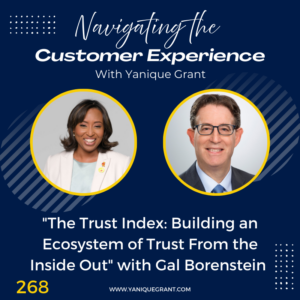Welcome to Navigating the Customer Experience. Thank you so much for joining us today for another episode. We have been on a little hiatus, our last episode published was the latter part of December 2022. It’s been a roller coaster of 2023. And I’m so happy to bring you another episode of Navigating the Customer Experience. This episode is not an episode with a guest, it’s a solo episode.
And I just wanted to kind of start off the year with some key reminders that I believe as a business regardless of whether you’re a solopreneur, or you’re an entrepreneur with a small client base, medium client base, large client base, whether you’re service based, or product and service based, that we take some time to look at the importance of being responsive.
And I think it’s critical for us to be responsive as business owners or employees in an organization with team members as well as with customers. Now, responsiveness is so important and it’s not just about being polite and friendly, it’s actually a very key component that can guarantee whether or not you’re going to be successful, or you’re going to be unsuccessful.
So really, and truly, what does it mean to be responsive, it really means being available and attentive to your customers’ needs. And those two needs are their emotional and their intellectual needs. If you’ve listened to my podcast before, you will know that emotional speaks to how you make your customer feel. Whether it’s your internal or your external customer, and intellectual speaks to on a cognitive level, what do they understand from what you’ve communicated to them?
Being responsive means that you’re quick to respond to any inquiries, complaints or feedback. And it means taking the time to listen to your customers and to make them feel heard and valued. So, you might be thinking to yourself, “Well, of course, I respond to my customers. That’s just basic customer service.” But there’s some more components as it relates to responding to customers.
There are things that you have to take into account such as when do you respond to customers? How quickly do they actually get a response from you? Now, the global standard for response time pre COVID was 24 hours. And by 24 hours, I mean, at least giving some acknowledgement to the person who sent you a message or gave you a call, or send an email asking for information, it could be a request they’re asking to be fulfilled, it could be an issue they have that they need to be resolved, that’s highly time sensitive.
Regardless, you take the time to respond, post COVID, the expectation of the average customer is at a level of response within an hour, blows our mind that the time has been reduced. But it just shows you that COVID has definitely brought to the front that we need to pay attention to our customers, we need our customers and we need to ensure that our customers know that we value and appreciate them. So yes, I’m sure as a business you do respond to your customers but if you were to do an audit to identify what is your response time? Is it fair to say that you are responding within the expected times? Or is your communication delayed? And if your communication is delayed, how is that impacting your customer and their business.
So, being responsive means being proactive in addressing your customers concerns. It means anticipating their needs and addressing potential issues before they become problems. It means being available to your customers across all of your different channels, whether that be live chat, telephone, face to face, email, social media, you name it, whatever channel you’re available on, can your customers realistically get a response from you?
So, why is being responsive so important? Well, for starters, it’s essential for building trust with your customers. Your trust is going to be broken down with the organization or with the employees in that organisation if they don’t feel like you are truly valuing them as a person and they can depend on you and they can count on you. So, they’re more likely to trust an organization or a person in an organization who is highly responsive. Those are some of the bedrock components of really ensuring that you build a strong bond or strong relationships with your customers, and of course to ensure that you have future business.
But beyond that, being responsive is also crucial for resolving issues quickly and effectively. Now, most customers reach out to a business for primarily two reasons. They either have a request, and it could be a new request or a request adding on to existing services or products that they have with you already. Or they’re calling because they’re having a problem and they want you to fix the problem. Those are absolutely the only two reasons that customers reach out to a business place.
And so, you want to ensure that depending on the importance of the issue of why the customer is reaching out to you that you get back in touch with them as soon as possible. I recently had an experience with a freight forwarder that I use here in Kingston, Jamaica. I ordered some parts, and it was for a fridge. So, it was very sensitive. The vendor that I did business with overseas, they were really quick, I didn’t pay for expedited shipping or anything, but they were able to get the item to my freight forwarder within two days of placing the order. However, it took almost, I would say 15 to 18 days, including weekends for me to actually receive the product here in Jamaica in my hand physically.
I had to send an email to the organization with the invoice asking what is the status, you have received this item from the 13th of February, it’s now the 25th of February, what is the status, nobody has responded to my email that I’ve sent, days have passed, I’m now having to call and request to speak with a supervisor. In speaking with a supervisor, she’s giving me information that’s not consistent with the information that’s on their website, or on their app that’s on my phone. And it was just so frustrating, the whole experience was extremely frustrating. But what really floored me in that experience was in the conversation with the supervisor, I asked her for her last name and her response was, “Why do you want to know that?” I was totally floored, I was like, “Is this lady for real?” Is she really in customer service?
So, I took it a step further and I asked her, “May I have your position at this organisation?” And she said, “I’m the supervisor for customer service.” And that was just even more mind blowing, because I’m thinking to myself, you work in an organization, giving your first and last name is not a secret, you should be open to giving information, you should not be hiding or shying away from your customers, they have chosen you over other organizations that are in this space and they’re having a genuine issue that is very serious. And they’ve called you, they’ve reached out to you, they’ve sent an email to you, they’ve reached out to you on multiple channels.
And they’re asking for your name as a reference point, and you are being defensive, you’re not being cooperative, you’re operating as if I’ve called you at your home and I’m asking for some very personal information that is beyond your ability to give to me. And it just really turned me off completely from the experience. And I’m actually even considering thinking of moving my business from them just because of that one interaction.
Funny enough, at the end of the whole experience, I actually gave her some advice. I told her that I’m a customer service trainer, and I just wanted to give you some feedback on some of the experiences that I had with you through this entire process. And she was quite defensive when I gave her the feedback. She was like, well, the reason why I did it was because of this. And she was giving all sorts of reasons instead of humbly just saying, “I really, truly appreciate your feedback. And we definitely will try and improve going forward.” That to me would have been a more acceptable response than her high level of defensiveness because it’s clear based on her response and her tone, she genuinely didn’t see anything wrong with her behaviour or what she did.
And it just goes to wonder if that as a Supervisor, “What role model behaviour is she presenting to the team that she’s supervising?” And what are they being guided by? And what kinds of interactions are they having with their customers?
So, being responsive is more than just answering a question. It’s more than just ensuring that you’re providing feedback in real time to your customers, but it’s also ensuring that you’re giving accurate information. It’s ensuring that if you’re not sure about something, you verify that information before you relate to the customer on whatever channel it is that you’re publishing this information to for your customer.
It’s also ensuring that you don’t get defensive when you receive feedback because we’re not perfect as human beings. We are imperfect, we make mistakes, I make mistakes. Yes, I’m a customer service trainer and I do know best practices. But I’m human, I make mistakes too. And I’m big and bold enough to say, “I’m sorry, I really didn’t mean it, that was not my intention, I will try to do better. I apologize.” And you say it from a place of authenticity, that the person that you’re apologising to, genuinely realizes that you are being sincere about your behaviour.
So, as we embark on the remainder of 2023, we’ve just started the third month. I just want to remind you, those of you loyal listeners that have been on this journey with me “Navigating the Customer Experience,” since May 2016, it’s been such a rewarding and amazing journey, that being responsive is one of the key ways that you can ensure that you build strong relationships with your customers, it shows that you value them, it creates a positive experience, it definitely will lead to greater word of mouth advertising and a positive perception of your brand. And persons will be more inclined to intrinsically want to recommend you to their friends and family based on the experiences that they have with you.
So, as we wrap up today’s episode, I just want to give you some tips as it relates to being responsive. So, keep in mind that in order to be responsive, you need to ensure that the channels that you have your business or your service, your product out there on that you have someone monitoring those channels, and that you are getting in touch with your customers and keeping them up to date as to any delays or challenges that they may be experiencing.
It’s also important that you respond to any inquiries and complaints in a timely manner, and set reasonable and clear expectations so your customers know exactly what to expect and when to expect it. Customers aren’t mind readers and as I said to you before, we’re not perfect, we’re going to make mistakes. But it’s important if there are delays, to take that telephone up, give them a call and say, “Hey, we’re having a delay” or jump onto your email and send out that email and say, “Hey, we know we had indicated that the product will be delivered by x or that you’d be able to pick up or you’d be able to have this delivery. However, we are experiencing a delay and we do anticipate that the new delivery date or the new time for expectation of this service is x.” So they know.
And if they have to make any changes on their end, there is more than enough time for them to put that in place.
And thirdly, try to be proactive in addressing potential issues. So, you want to keep abreast of what’s happening. Ensure that you’re aware of all of the things that are going around, make sure that you are communicating with your customers and try to make yourself available. We are in the age of information and customers have so many ways that they can reach out to us.
So, regardless of the channel that you put yourself out there on, try to ensure that you’re monitoring those channels, that you’re being proactive, that when you receive feedback, you receive it in a very humble and positive way, and look for opportunities to make it better the next time. Because those customers that complain and give you feedback, they genuinely want to continue doing business with you, that’s why they’ve actually taken the time to give you that feedback.
So, those are my recommendations, that’s how I kind of want to start off with you for 2023. Just remember that you should treat others the way you would like to be treated and if you genuinely don’t appreciate when people don’t call you back, when people don’t give you accurate information, when people don’t respond to your requests or queries in a timely manner, don’t practice doing it with others. Try to give what you expect. Try to give what you would like to receive and you’d be surprised to know that life is like a boomerang, whatever you give out, it will roll right back into you.
So, just want to remind our listeners if you’d like to follow us on Twitter, feel free to hop onto Twitter, our handle is @navigatingcx and if you’d like to join our private Facebook group, it’s called @NavigatingtheCustomerExperienceCommunity.
And of course, always have to give a plug, if you’re interested in purchasing our book, “The ABC’s of a Fantastic Customer Experience.” that actually has a chapter on response time. You can head over to Amazon and purchase either a digital copy or a physical copy for you or your team to help enhance all the behaviours and competencies that you want to ensure your team members are continually delivering on it in your customer interactions, whether those be internal or external. So, thank you so much for listening, until next time I’m your host Yanique Grant.
Grab the Freebie on Our Website – TOP 10 Online Business Resources for Small Business Owners
The ABC’s of a Fantastic Customer Experience
Do you want to pivot your online customer experience and build loyalty – get a copy of “The ABC’s of a Fantastic Customer Experience.”
The ABC’s of a Fantastic Customer Experience provides 26 easy to follow steps and techniques that helps your business to achieve success and build brand loyalty.
This Guide to Limitless, Happy and Loyal Customers will help you to strengthen your service delivery, enhance your knowledge and appreciation of the customer experience and provide tips and practical strategies that you can start implementing immediately!
This book will develop your customer service skills and sharpen your attention to detail when serving others.
Master your customer experience and develop those knock your socks off techniques that will lead to lifetime customers. Your customers will only want to work with your business and it will be your brand differentiator. It will lead to recruiters to seek you out by providing practical examples on how to deliver a winning customer service experience!





